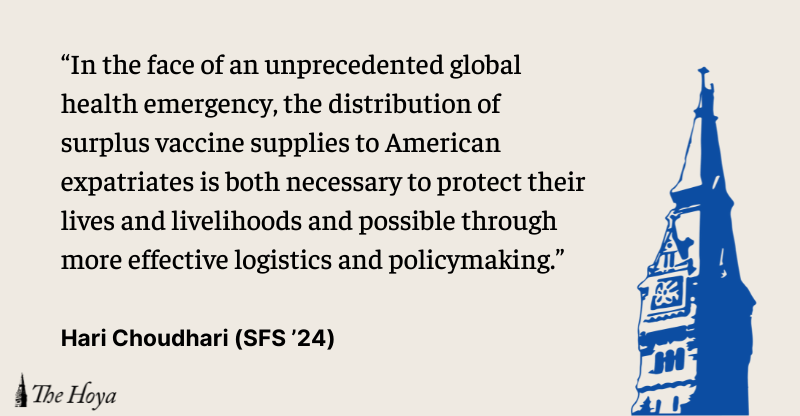Just a few months ago, India was ground zero for the COVID-19 pandemic. Deadly strains and unprecedented case numbers rendered hardship and loss the norm for almost every family across the nation. Even as the catastrophic surge of cases receded, American expatriates living in India are still facing a key problem: a critical lack of access to vaccines.
In the face of an unprecedented global health emergency, the distribution of surplus vaccine supplies to American expatriates is both necessary to protect their lives and livelihoods and possible through more effective logistics and policymaking.
Throughout the pandemic, American citizens residing in India were marooned on foreign soil during a health emergency. While embassy and consular staff worldwide have been inoculated, the U.S. government still refuses to provide vaccines to expatriates, with White House Press Secretary Jen Psaki saying: “We have not historically provided private health care for Americans living overseas, so that remains our policy.” Taxpaying American voters living abroad have therefore been given two options: hope for a vaccination in their country of residence, or fly back to the United States to be inoculated.
For 16-year-old American citizen Asray Gopa, a student in my hometown of Bangalore, India, this choice is an impossibly hard one. While he would be eligible for a Pfizer vaccination in the United States, there are no vaccines approved for those under the age of 18 in India. Even if a vaccine were approved for young people like Asray, there are still considerable shortages in India, meaning any shot at all would be difficult to receive. Lack of vaccines leaves unvaccinated children in the direct path of the Delta variant resurgence.
“They say a third wave is coming soon, and they may be opening up schools,” Asray said in a Zoom interview. “Without vaccinations, that makes me worried.”
Flying to the United States for a vaccine is unreasonable for many expatriate families in India, according to Asray.
“There are six of us in our family, so we’d have to spend $10,000 just to go to the States,” Asray said. “My relatives all moved back to India, so we’d have to find friends to take us in. It really doesn’t make sense.”
The fact that many expatriate families, Asray’s included, have noncitizen grandparents or dependents who became severely ill from COVID-19 also makes traveling to the United States impossible. Abandoning loved ones to fly to the United States would be out of the question.
Further, college vaccination requirements have placed many expatriate students in a difficult situation. Students have been forced unvaccinated in the hopes of receiving a shot from their university on arrival. This is compounded by selective recognition of non-U.S. vaccines. Georgetown University, for instance, recognizes one of the two vaccines on offer in India, COVISHIELD, but not indigenously produced COVAXIN, meaning that some students who have managed to get a shot aren’t even considered vaccinated by the university.
Recognizing these hardships as not simply an expatriate problem, but an American problem, is necessary. Whether they live in Bangalore or Baltimore, Delhi or Dallas, these are American children at risk, American senior citizens fighting for their lives and American families faced with the choice between financial hardship and their own health.
It also must be recognized that American expatriates in other countries often face even less consistent access to vaccines than in India. Elderly citizens stranded in Thailand and South Africa, countries with endemic shortages of COVID-19 vaccines, have been petitioning the U.S. Department of State for vaccine access since May, but to no avail.
This is not to say the United States should deprioritize providing vaccine doses to at-risk citizens of these foreign countries. As of Aug. 3, the Biden administration has delivered 110 million doses to 65 countries — an admirable success. However, the goals of delivering vaccines to foreign countries and to U.S. expatriate communities should not be mutually exclusive. In fact, America has wasted around 15 million COVID-19 vaccine doses on home soil — more than enough to vaccinate the entire American expatriate population of 9 million.
The U.S. government must fully acknowledge its obligation to its citizens in a time of crisis. Taxpaying American expatriates face potentially life-threatening consequences without adequate vaccine accommodations. All they ask is for the U.S. government to recognize this burden.
Hari Choudhari is a sophomore in the School of Foreign Service.















covid19 • Nov 8, 2021 at 6:16 pm
Hi all, You may have performed a fantastic job. I’m going to absolutely yahoo that and in our advocate so that you can friends and neighbors. I’m certain they are taken advantage of this excellent website.. covid19
Taxed Globally, Snubbed Locally • Oct 2, 2021 at 9:39 am
Hear, hear.